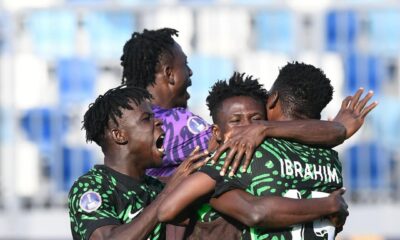Features
Mfonobong Inyang: Much Ado About Elections, Legalese and Football
One of the fundamental things I learned from my discipline is that politics and economics are joined at the hip; political (governance) decisions have commensurate socio-economic implications. Citing the comeback story of Kodak, I mentioned that even in a pandemic, investors still put money in a once unattractive company because the ‘white noise’ was managed to an extent.
 In Nigeria, the 2023 general elections are less than three years away but I can tell you for free that many political actors are already making their moves and like vectors, they are getting in position. Taking a more cursory look at the news, especially with the rumblings that seem to herald the off-season elections in Edo and Ondo states, you may not be wrong to posit that there are strong 2023 undercurrents. Like pawns on a chessboard, these players want to make winning moves.
In Nigeria, the 2023 general elections are less than three years away but I can tell you for free that many political actors are already making their moves and like vectors, they are getting in position. Taking a more cursory look at the news, especially with the rumblings that seem to herald the off-season elections in Edo and Ondo states, you may not be wrong to posit that there are strong 2023 undercurrents. Like pawns on a chessboard, these players want to make winning moves.
The question is: how proactive are other stakeholders as we count down to 2023?
My Learned Colleagues
I almost studied law before eventually opting for economics, so I guess I never lost touch of my ‘legalese’. It was with keen interest that I followed my friends in the wig and gown as they campaigned and voted to decide the next president of the Nigerian Bar Association (NBA). Although the headlines were more about Olumide Akpata defeating two Senior Advocates of Nigeria (SAN) in a landslide, and emerging as the NBA’s first non-SAN president in years, my thoughts were on the process.
The process was virtual; eligible voters and members of the association logged onto the National Officers Election’s webpage with their Supreme Court Numbers to cast their votes via emails and SMS. Within hours, the winner was declared after “having scored the highest number of votes cast and satisfied the provisions of the constitution of the NBA 2015 (as amended)”.
For me, it felt like an epiphany. One wonders if what a microcosm of Nigeria can achieve, a country of 200 million people can also achieve.
Of course, I am not expecting that to happen in the 2023 elections but I am suggesting that we should start having conversations about the role and extent of technology in future elections. Pulling aside the curtain of the carnage caused by Coronavirus, we see that the pandemic has accelerated and brought forward things we once thought will be feasible only in some far-flung future. In these very interesting times, countries all over the world are finding innovative ways of conducting credible polls in a pandemic. I don’t see why Nigeria shouldn’t do likewise.
Interestingly, the Independent National Electoral Commission (INEC) set up a portal last week for live transmission of results from polling units. That’s a great start; but when I remember the curious case of “server or no server”, I believe that good intentions aren’t enough. It must be domiciled in the Electoral Act. We need those electoral reforms now because, as history has taught us since 1999, the closer we get to general elections, the less political will is available to do the needful. Otherwise, mandates that are gotten from polls may be lost in the courts.
A Song Of Fire And Ice!
“Every time a new Targaryen is born, the gods toss a coin in the air and the world holds its breath to see how it will land.”
Perhaps, Ser Barristan’s words from the popular HBO series, Game of Thrones comes to mind whenever it’s time for elections in Nigeria. In our nascent history as a country, especially since 1999 when we transited from military to civilian rule, elections have been bitter-sweet experiences for the Nigerian electorates.
I was a presiding officer in the 2015 elections and part of those who monitored the 2019 elections so I’ve seen, first-hand, some of the challenges people face when they want to cast their votes. Elections come at a great cost of not just finances but of uncertainty. Households and businesses cannot plan long-term because they don’t know what to expect. This tension is both unnecessary and unprofitable in the grand scheme of things. It’s like driving beside a truck and not knowing if it will fall on your car or not.
I was asked to share my thoughts on why we’re struggling to get and retain more Foreign Direct Investments (FDIs) in our domestic economy and instinctively I responded, “Investors don’t like surprises”. One of the fundamental things I learned from my discipline is that politics and economics are joined at the hip; political (governance) decisions have commensurate socio-economic implications. Citing the comeback story of Kodak, I mentioned that even in a pandemic, investors still put money in a once unattractive company because the ‘white noise’ was managed to an extent.
The North Remembers
Arsenal Football Club, a team from North London had been trolled as a ‘big’ club that struggled to beat teams in the English Premier League’s (EPL) ‘Big Six’. However, as this season drew to a close, within one month, they defeated the reigning champion, Liverpool. They defeated the penultimate champion, Manchester City. They also defeated Chelsea, a team they lost a final to in Baku to win the FA Cup for a record-extending 14 times. Some Gunners aficionados dubbed it “The Arteta Effect” but for me, it was simply a metaphor for change in strategy!
Nigeria needs to look at her ‘arsenal’ – our pool of eggheads, innovators, thinkers, strategists, culturists, futurists. It’s time to gather the gifted!
As I pondered anew on the etymology of the word ‘remember’, I discovered that it’s beyond the recollection of memories. Re-member means to successfully reassemble the ‘dis-membered’ parts of something that was ab initio whole. Putting it in more artistic terms, it means to take the pieces of something and make a masterpiece out of it. Nigeria, as a ‘big’ country that we are, should take the pieces of the 1999, 2003, 2007, 2011, 2015 and 2019 elections and make a masterpiece in 2023!
We Just Wanna Relass And Be Taken Kiaruf!
12th of August every year is celebrated as International Youth Day and this year’s theme, Youth Engagement for Global Action, seeks to highlight the ways in which the “engagement of young people at the local, national and global levels is enriching national and multilateral institutions and processes, as well as draw lessons on how their representation and engagement in formal institutional politics can be significantly enhanced.”
As millennials, we get the stick during elections because we’re accused of tweeting more than voting – a valid argument. However, in my little study and experience in business, I appreciate the psychology of sales. In part, it requires that you’re able to connect to your predominant demography if your business is to remain profitable.
At least 60% of Nigerians are below 30 years. Young people have peculiar lifestyles in which they consider pop culture; they communicate, work, and trade at the click of a button. So it evokes apathy from that demography when you ask them to participate in a process that is cumbersome and protracted. Why reality shows make a killing from young people via voting is that they have discovered the hack, anything that you sell to a young person must be couched in convenience.
In 2023, we should take into consideration the ‘convenience factor’ at the polls and we will see ‘yoots’ in their numbers! People like us have already decided that we are here for a better Nigeria. Our watch never ends. No leave, no transfer!























